- Clone
- A17013A (See other available formats)
- Regulatory Status
- RUO
- Other Names
- Leukocyte C-terminal Src kinase, Protein YT16, p56-Lck, T cell-specific protein-tyrosine kinase
- Isotype
- Mouse IgG1, κ
- Ave. Rating
- Submit a Review
- Product Citations
- publications
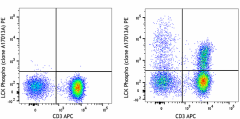
-

Human peripheral blood lymphocytes were left untreated (left) or treated with Hydrogen Peroxide for 5 minutes (right), fixed with Fixation Buffer (Cat. No. 420801), permeabilized with True-Phos™ Perm Buffer (Cat. No. 425401), then surfaced stained with CD3 APC and intracellularly stained with anti-LCK Phospho (Tyr505) (clone A17013A) PE.
| Cat # | Size | Price | Quantity Check Availability | Save | ||
|---|---|---|---|---|---|---|
| 699703 | 25 tests | 117€ | ||||
| 699704 | 100 tests | 298€ | ||||
The Src family tyrosine kinase p56Lck (Lck) is a non-receptor tyrosine kinase that is primarily expressed in T cells and NK cells. It plays a critical role in T cell selection and maturation within the thymus, and also in the function of mature T cells. Lck, which is constitutively bound to cytosolic domains of CD4 and CD8 surface receptors, plays an essential role in T cell receptor (TCR) signaling. Engagement of the TCR with peptide antigen-loaded MHC complex results in the recruitment of CD4- and CD8-bound Lck to the TCR/CD3 signaling complex. Lck then transphosphorylates TCR-gamma chains and CD3 subunits, thereby activating the TCR/CD3 signaling pathway and leading to the recruitment and subsequent phosphorylation of Zap70 by Lck. Lck also plays an important role in interleukin-2 signaling that regulates the T cell proliferative response. Phosphorylation of Lck by CSK at Tyrosine 505 negatively regulates Lck, and is proposed to generate a closed, inactive conformation of the protein.
Product DetailsProduct Details
- Verified Reactivity
- Human
- Antibody Type
- Monoclonal
- Host Species
- Mouse
- Immunogen
- Human Lck peptide phosphorylated at Tyr 505.
- Formulation
- Phosphate-buffered solution, pH 7.2, containing 0.09% sodium azide and BSA (origin USA)
- Preparation
- The antibody was purified by affinity chromatography and conjugated with PE under optimal conditions.
- Concentration
- Lot-specific (to obtain lot-specific concentration and expiration, please enter the lot number in our Certificate of Analysis online tool.)
- Storage & Handling
- The antibody solution should be stored undiluted between 2°C and 8°C, and protected from prolonged exposure to light. Do not freeze.
- Application
-
ICFC - Quality tested
- Recommended Usage
-
Each lot of this antibody is quality control tested by intracellular flow cytometry using our True-Phos™ Perm Buffer in Cell Suspensions Protocol. For flow cytometric staining, the suggested use of this reagent is 5 µl per million cells in 100 µl staining volume or 5 µl per 100 µl of whole blood.
- Excitation Laser
-
Blue Laser (488 nm)
Green Laser (532 nm)/Yellow-Green Laser (561 nm)
- RRID
-
AB_2801136 (BioLegend Cat. No. 699703)
AB_2801136 (BioLegend Cat. No. 699704)
Antigen Details
- Structure
- 509 and 539 amino acid isoforms with predicted molecular weights of 58 and 61 kD, respectively. Contains N-terminal domain with myristylation and palmitoylation sites, a kinase domain, and SH2 and SH3 domains that mediate protein-protein interactions between Lck and other proteins.
- Distribution
-
T cells
- Function
- T cell receptor signaling
- Interaction
- AXL, CD2, CD4, CD5, CD8, CD44, CD45, CD122, PI4K, VAV1, RASA1, FYB, CDK1, RAF1, ZAP70, SYK, RUNX3
- Cell Type
- T cells
- Biology Area
- Cell Biology, Signal Transduction
- Molecular Family
- Phospho-Proteins, Protein Kinases/Phosphatase
- Antigen References
-
- Phillipsen L, et al. 2017. Sci Signal. 10:eaaf4736.
- Moogk D, et al. 2016. J Immunol. 197:644.
- Klammt C, et al. 2015. Nat Immunol. 16:961.
- Cancer Genome Atlas Network. 2015. Cell. 161:1681.
- Casas J, et al. 2014. Nat Commun. 5:5624
- McNeill L, et al. 2007. Immunnity. 27:425.
- Lefebvre DC, et al. 2003. Biochim Biophys Acta. 1650:40.
- Kabouridis PS. 2003. Biochem J. 371:907.
- Gene ID
- 3932 View all products for this Gene ID
- UniProt
- View information about Lck Phospho Tyr505 on UniProt.org
Related Pages & Pathways
Pages
Related FAQs
- What type of PE do you use in your conjugates?
- We use R-PE in our conjugates.
Other Formats
View All Lck Phospho (Tyr505) Reagents Request Custom Conjugation| Description | Clone | Applications |
|---|---|---|
| Purified anti-Lck Phospho (Tyr505) | A17013A | ICFC |
| PE anti-Lck Phospho (Tyr505) | A17013A | ICFC |
Customers Also Purchased
Compare Data Across All Formats
This data display is provided for general comparisons between formats.
Your actual data may vary due to variations in samples, target cells, instruments and their settings, staining conditions, and other factors.
If you need assistance with selecting the best format contact our expert technical support team.
-
Purified anti-Lck Phospho (Tyr505)
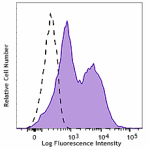
Human peripheral blood lymphocytes were treated with (filled... -
PE anti-Lck Phospho (Tyr505)

Human peripheral blood lymphocytes were left untreated (left...
 Login / Register
Login / Register 









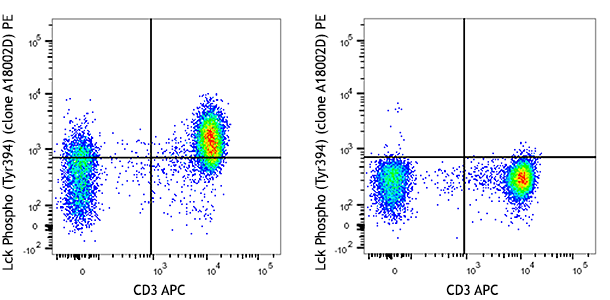
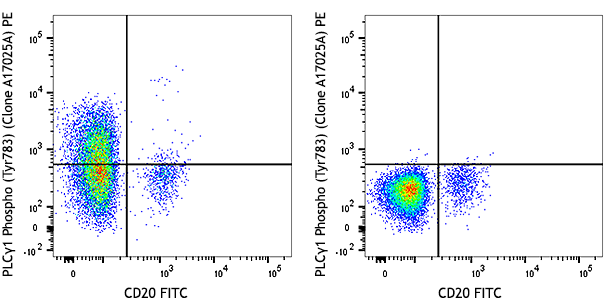
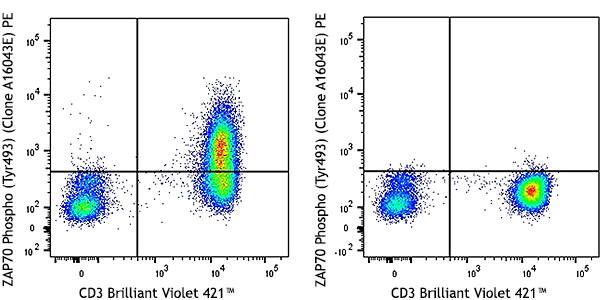
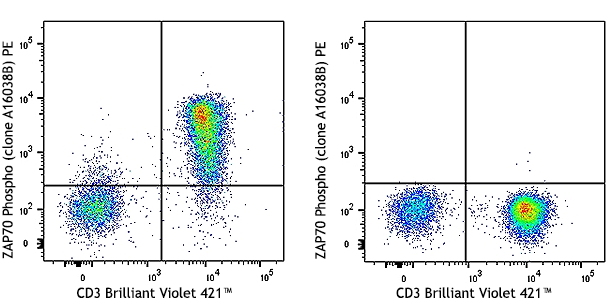



Follow Us